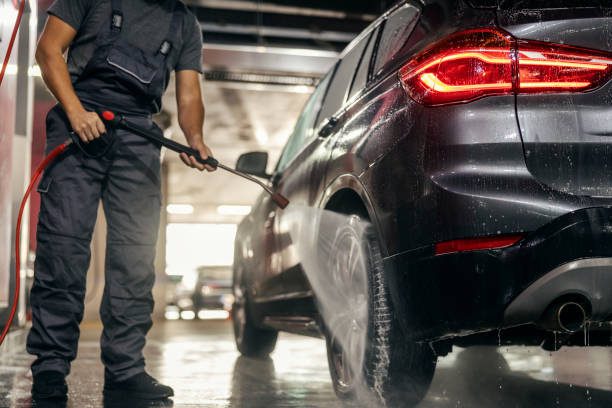Most of us don’t think twice about how sustainable the car-washing procedure is when we do it. Regrettably, a number of aspects of routine car washing, such as the type of soap we use and the amount of water we waste, can negatively impact the environment.
Having stated that, how can you wash your automobile in a sustainable manner? Which is more environmentally friendly: washing it by hand or having it done at a car wash?
The most sustainable type of car wash is definitely a commercial one.
It may seem that the easiest method to manage some sustainability-related factors is to wash your automobile by hand. For example, you have control over how much water you use. Another option is to select a soap brand that is eco-friendly or sustainable. However, a lot of experts believe that the best way to maintain this seemingly harmless hobby as sustainable as possible is to use a commercial vehicle wash.
Car washes are often more environmentally friendly, according to Ecomena, since they are more prepared to handle the soapy, soot-filled discharge that comes off your car in the rinse than you would be at home. This is so that all of the wastewater that is released during a car wash can be treated before being flushed down the drain. If you were at home, you would probably just ignore the suds that wash into the storm drain from the driveway.
Additionally, automated systems are used in car washes to control water pressure and optimize effectiveness. They don’t want to waste any water that they don’t have to while washing your car because they usually have to pay for it. Therefore, although using a professional car wash may cost a little more, you’ll save time and effort in addition to saving energy and water.
How to increase the sustainability of a car wash at home:
Here are some suggestions for washing your car yourself in an environmentally responsible manner if you feel compelled to do so.
Cleaning on grass or gravel can help cut down on pollutants.
Most of the soap and petroleum runoff from washing your car in the driveway or on the street ends up in the storm drains and into the sewers. Though it is more likely to flow out into a nearby sump, creek, or local river, those sewers may carry it to a water treatment plant.
When washing your car, Wrench says the simplest method to prevent this unnecessary pollution is to park it on grass or gravel. In this manner, neither the water nor these contaminants will wind up in significant freshwater sources. Although having the water sink into the earth is still not ideal, it should have less of an effect on the environment than if it went into the storm drains on your street.
Additionally, Wrench advises gathering as much of the soiled water as you can in a pail and disposing of it in the toilet or sink. The majority of the water that passes through your pipes is treated at the nearby facility, so before it continues on its path, the soap and chemical runoff should be filtered out.
The correct chemicals can make a big impact. Harmful chemicals like phosphates, salt, and potassium are used in the production of many standard car wash products. These substances can seriously harm human health in addition to being harmful to animals and aquatic life. Many of the chemicals in these cleaning products release harmful vapors that can cause blindness in certain situations, chemical burns, skin and eye irritation, and respiratory issues, according to DetailXPerts.
Personal protective equipment (PPE) like goggles or gloves can only reduce exposure to a certain extent, though, because these chemicals can leave residue on automobile surfaces even after the car has dried. Fortunately, there are plenty of environmentally safe solutions available that may effectively remove dirt and grime without endangering the surfaces of your automobile, the environment, or your health.
Look for cleaning chemicals that are water-based, phosphate-free, or biodegradable when searching for these environmentally friendly vehicle wash supplies. Recognize that despite their advantages, these environmentally friendly choices are still not the best. The safest soaps nevertheless leave behind some kind of chemical residue. In this instance, Star Energy Partners advises using the least amount of soap possible to do the task. Cars that are only slightly dirty may only need a quick wipe down with a moist towel.
Water conservation is crucial.
One of the most important resources on Earth is potable water, and due to the numerous heat waves and droughts brought on by climate change, some regions are experiencing a shortage of this vital resource. Using as little water as possible is perhaps the most crucial aspect of maintaining a sustainable at-home vehicle wash. Wrench advises maximizing your precision cleaning and minimizing your total water usage by attaching a water spray gun attachment to your hose.



